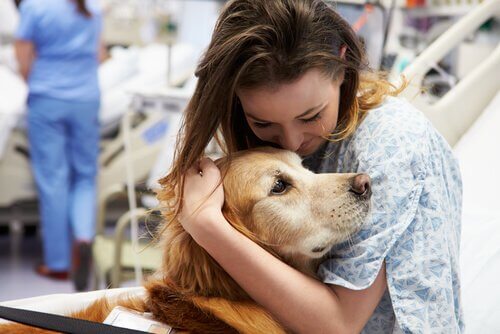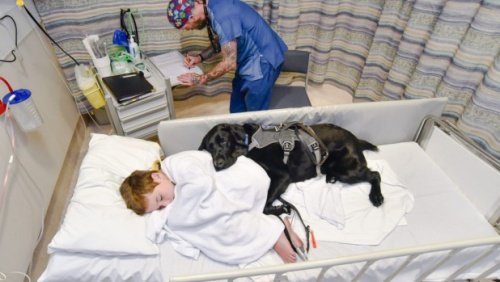Medical Response Dogs Who Save Lives

Pets can improve our lives and make us happier, we all know that. But some dogs can even save lives too! In this article, we want to share a story about medical response dogs who go to school… and even graduate! Read on to find out more…
School for medical response dogs

These are the wonderful stories about the medical response dogs at the Canem Therapy Centre in Zaragoza, Spain. One story centers around a Jack Russell called Cini. Cini was able to warn a woman when her glucose levels had started to drop, something which could lead to hypoglycemia.
With three loud barks and by pawing at his owner’s leg, Cini was able to save her. The smell of isoprene, a chemical which appears when the body’s glucose levels drop too much, is undetectable by humans, but dogs can smell it. Cini knew that Lidia, his owner, was in trouble.
“I’ve trusted him with my life”, says Lidia, something which she, of course, doesn’t regret. Cini is one of 56 canine graduates who go to the canine nursing school in Zaragoza. There they receive training to be assistants for people with different problems or illnesses, from diabetics or epileptics to blind people, people with allergies, and even disabled people.
What exactly is the Canem foundation?
Female dogs are more perceptive than males and are less distracted. They also learn quicker. Francisco Martin is the owner of the institution and told us a little about the course.
The breed is really important. Some have greater abilities to detect illnesses or anomalies. Labradors, Jack Russells, and Bernese Mountain Dogs are used the most. Another important factor is their strength, intelligence, and personality.
In the case of the Bernese Mountain Dog, they’re very calm but portly (they can weigh up to 90 pounds), so they’re perfect for children or autistics. Labradors are very intelligent and usually work with deaf people or people with reduced mobility. Lastly, Jack Russells like Cini are more restless, live longer (up to 17 years), and are more alert. As a result, they usually work with patients with diabetes and epilepsy.
Medical response dogs, alert around the clock
In this dog training center, the course lasts for four months and is exhaustive. In order to graduate, the dogs need to successfully pass 8,500 tests. Once they leave the center, they will know exactly what to do when faced with the medical problem that they have been trained for.
Having such a skilled pet can be expensive, but in this school they ‘hire out’ the dogs on an indefinite basis until the dog (or the person) passes away. This way, the dog can be sure to receive plenty of affection from the family or patient. If for some reason the dog doesn’t carry out their job as they should, they return to the center for further training.
Their training teaches them to recognize the medical problem and know exactly how to react to it. Inside the school’s 1000 square feet, trainers recreate real-life situations in order to teach the dogs to be alert both day and night. The nighttime can be a critical time for some medical conditions, so trainers place a great deal of emphasis on this.
It’s also worth mentioning that the dogs are sterilized so that their hormonal changes don’t interfere with their work or their training.
Detecting the rise in glucose

One room at the school looks like a bedroom at nighttime. A diabetic trainer trains the dogs to detect a spike in glucose levels up to 20 minutes beforehand.
The dog’s stay in the center involves simulating real environments and situations with people who generally have a medical condition. This helps them learn to remain alert and attend to their owner’s health. Trainers monitor the dogs exhaustively and record all stages and exercises. This way, any mistakes can be detected and, if necessary, the trainers change their training.
Presently, Canem graduates can “only” work as medical response dogs for certain conditions or illnesses. However, in the future, this is sure to expand with the use of other breeds and new training techniques.